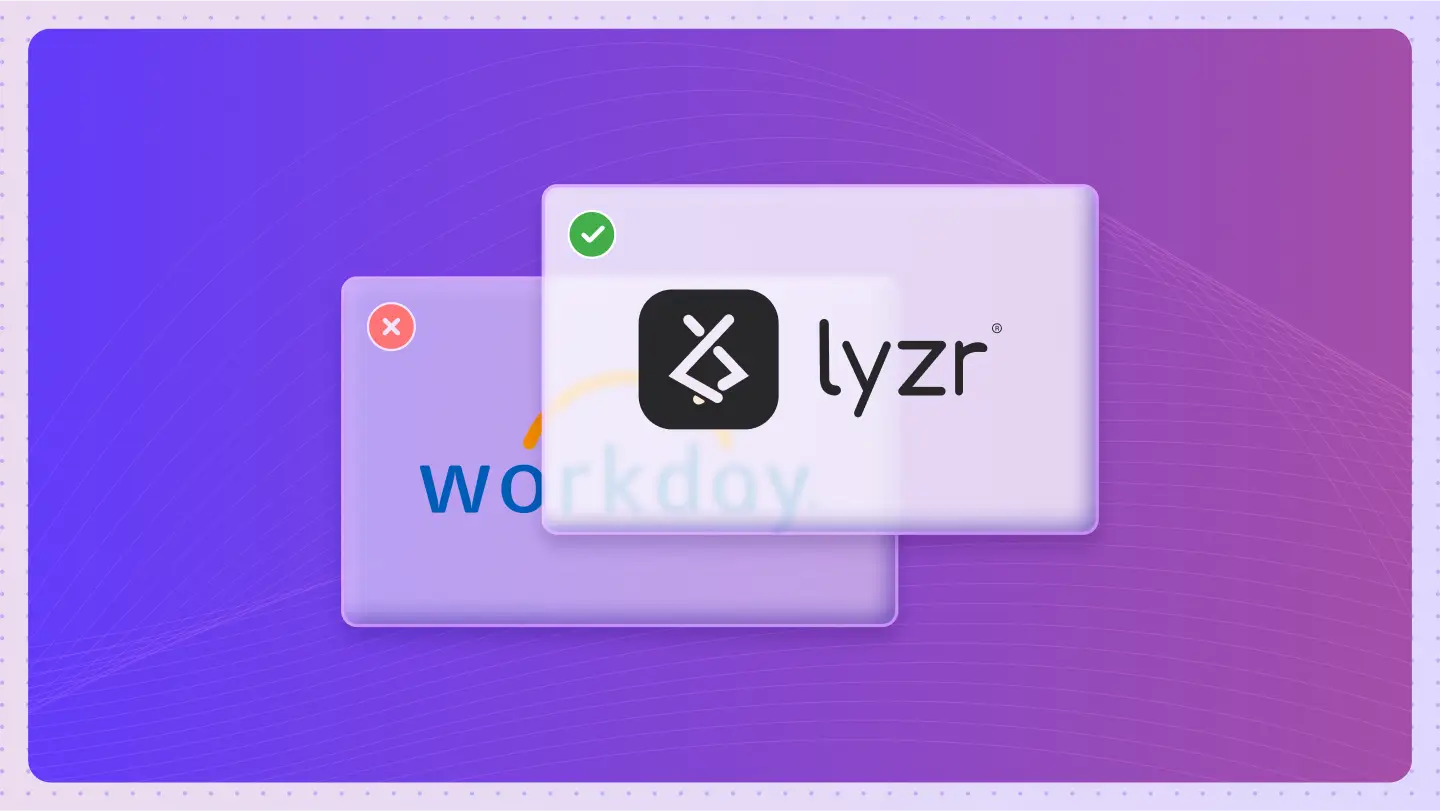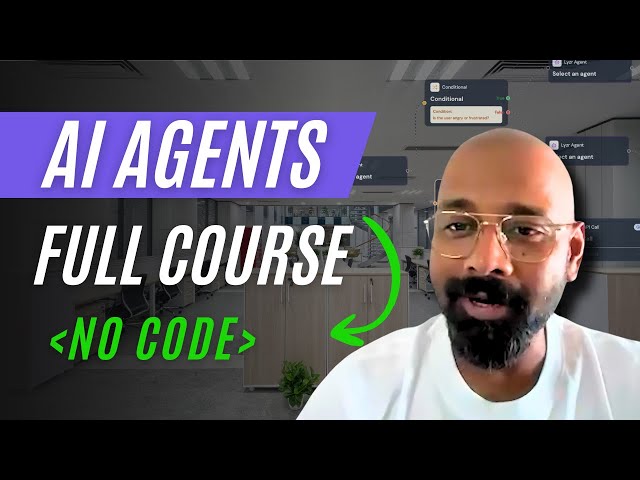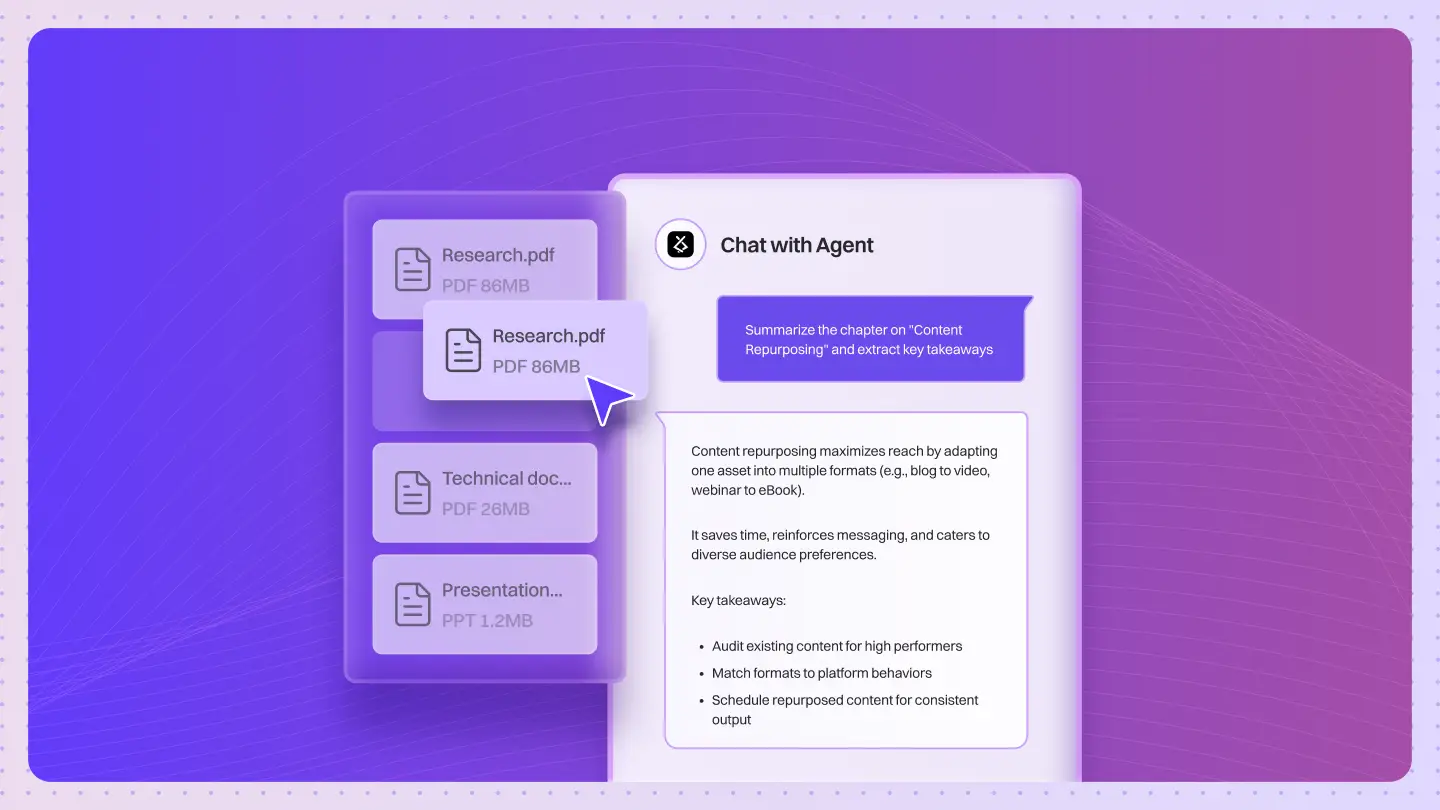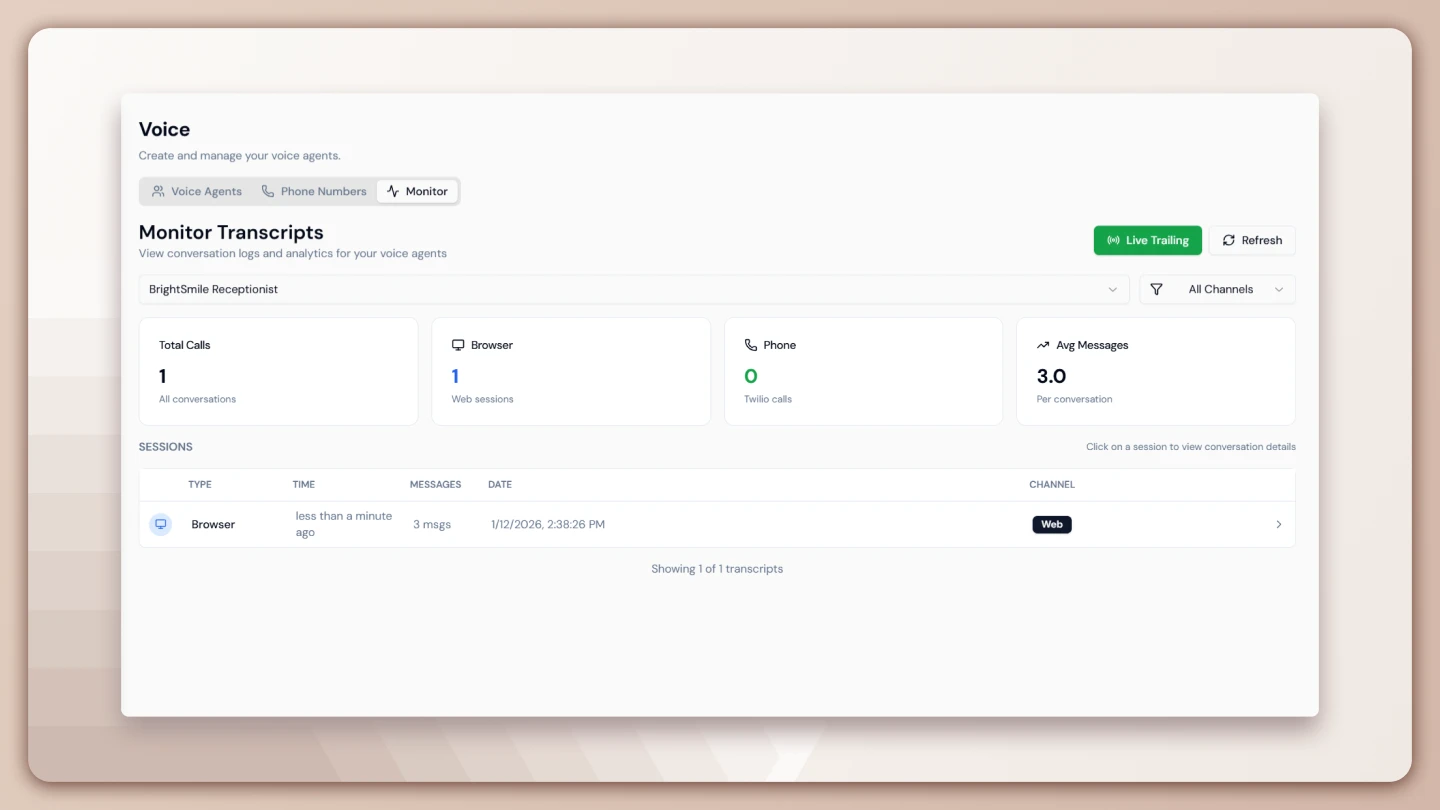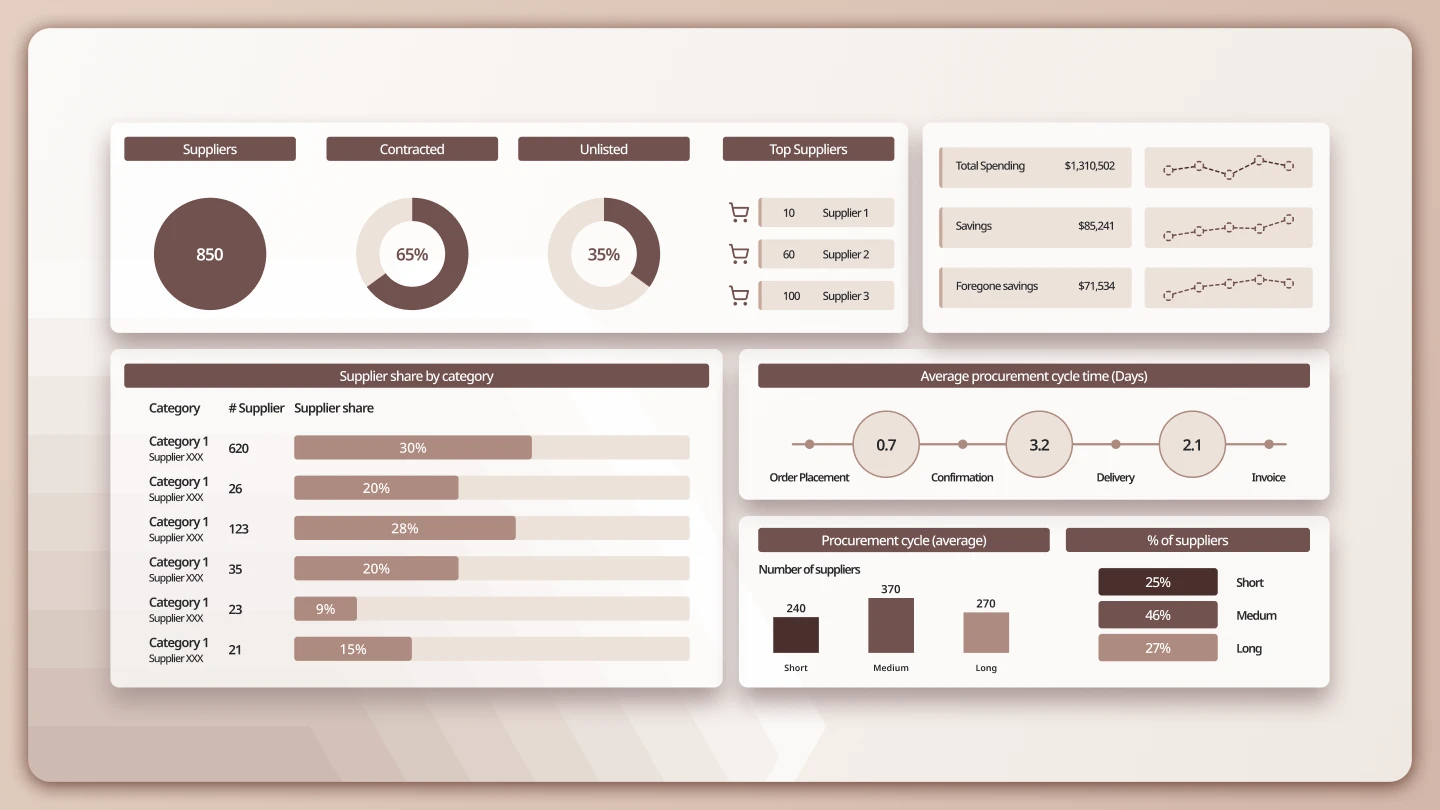Table of Contents
ToggleYour marketing team just mapped out a brilliant quarterly campaign. The ads are designed, the landing pages are wireframed, and the entire strategy hinges on a powerful, high-value eBook to capture leads.
Then, reality hits. Creating that eBook will take two months and half your content budget with a freelancer, or it will consume 40 hours of your tam’s precious time trying to wrangle and rewrite a soulless draft from a generic AI tool.
This content bottleneck is where great marketing strategies go to die. The delay costs you leads, momentum, and ultimately, revenue.
What if you could build that entire, high-quality eBook, researched, structured, and on-branding a fraction of the time and cost? What if you could turn your biggest bottleneck into a scalable content engine?
This article is for the modern marketer who is tired of compromising between speed, cost, and quality. We will provide a step-by-step guide on how to build a team of Lyzr AI agents to systematically generate a complete, lead-ready eBook. You will learn how to transform your content creation process from a roadblock into your most reliable competitive advantage.
The promise of “modern marketing” – with its endless tools, data, and channels was supposed to make our lives easier. Instead, for many, it has created a chaotic, inefficient, and soul-crushing system.
Here is the hard truth about why your modern content workflow is failing you.
The Core Failures of the Modern Content Workflow
We’re all chasing the same metrics, using the same tools, and falling into the same traps. The workflow isn’t a simplified highway; it’s a tangled mess of backroads leading to nowhere. Here are the four fundamental failures:
1. The Tyranny of the “Content Treadmill”
This is the biggest problem. We are obsessed with velocity. The demand is to publish, publish, publish. A blog post on Monday, a tweetstorm on Tuesday, a video on Wednesday, a webinar on Friday. We are feeding a machine that is perpetually hungry.
- The Result: Burnout and a flood of shallow, forgettable content. We’re creating content for algorithms, not for customers. Quality is sacrificed for quantity, and our brand voice becomes diluted noise. We’re running faster and faster just to stay in the same place.
2. The Silo Sickness
Your content workflow isn’t a single, unified process. It’s a series of disjointed handoffs between isolated teams.
- The SEO team provides a list of keywords.
- The content team writes an article to fit those keywords.
- The design team creates a generic graphic for it.
- The social team blasts it out with a generic caption.
- The sales team never even knows it exists.
- The Result: Inconsistent messaging, duplicated effort, and a complete lack of a cohesive customer journey. The content feels disjointed because the process that created it is disjointed.
3. The “Frankenstack” of Tools
We have a tool for everything: project management (Asana, Trello), collaboration (Slack, Teams), analytics (GA4), SEO (Ahrefs, SEMrush), design (Figma, Canva), and distribution (HubSpot, Hootsuite). Each tool is a separate island with its own data and its own logic.
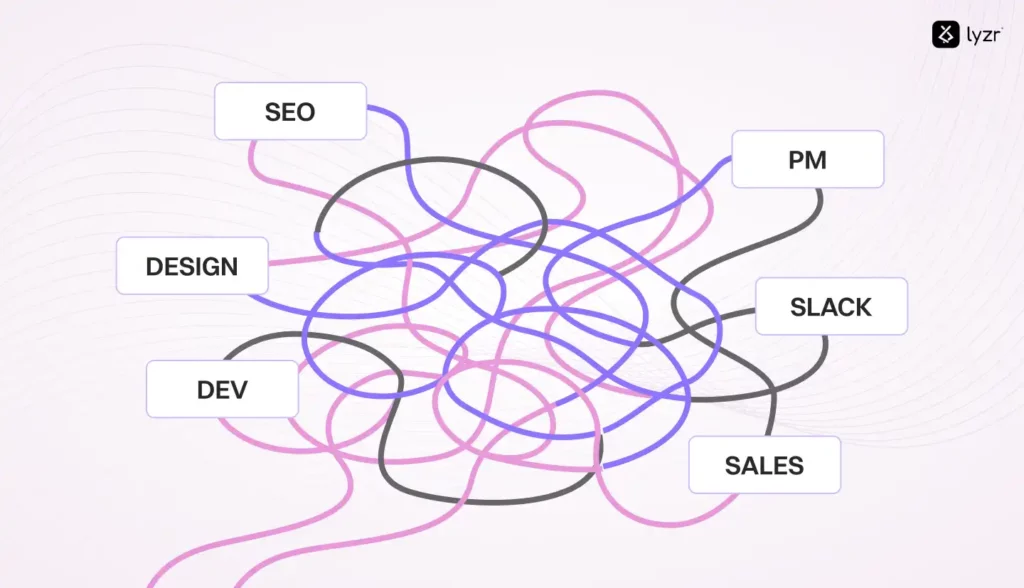
- The Result: A technological and data nightmare. We spend more time managing the tools than doing the actual work. Critical insights get lost between platforms, and it’s nearly impossible to get a single, clear view of performance. Attributing ROI becomes a black hole of “best guesses.”
4. The Strategy Void
When you’re trapped on the content treadmill, working within silos, and juggling a dozen tools, there’s no time for the most important thing: Strategy.
Content is created reactively, not proactively. It’s an endless series of one-off “assets” that aren’t tied to a larger narrative or business goal. We ask “What should we post today?” instead of “What foundational story do we need to tell over the next quarter to move the needle on our primary business objective?”
- The Result: “Random Acts of Content.” It might generate a few vanity metrics (likes, shares), but it fails to build brand equity, educate a market, or drive meaningful revenue
In an Age of Fleeting Content, eBooks Are Your Bedrock Asset
We are flooded with 30-second videos, ephemeral stories, and an endless scroll of hot takes that vanish from memory in moments. Attention has become the world’s most volatile currency.
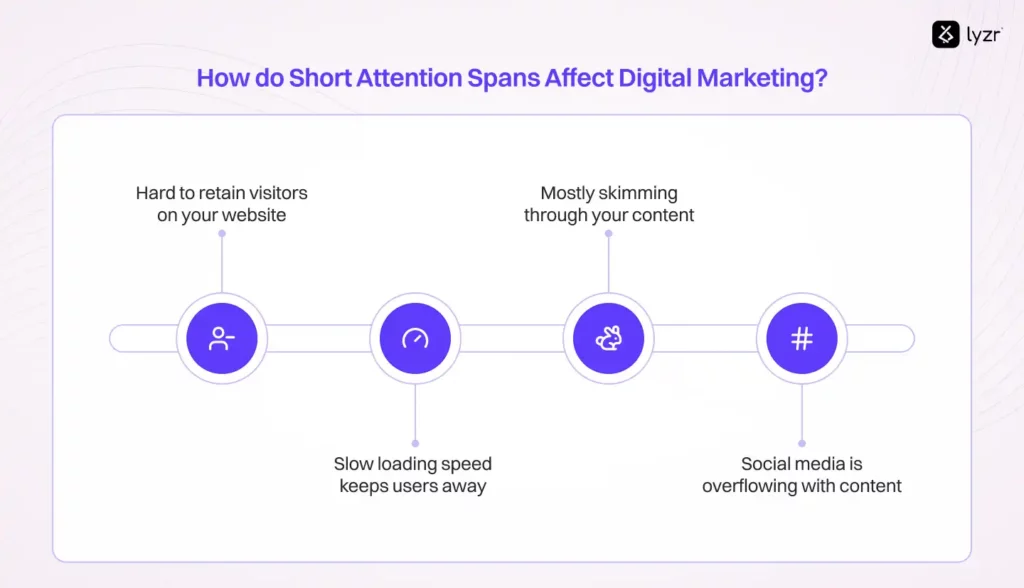
So, in this chaotic environment, why double down on eBooks arguably the most resource-intensive content format?
Because while other content rents attention, eBooks build equity. They are not just another item in your content calendar; they are strategic, foundational assets that deliver compounding returns. Ignoring them isn’t just a missed opportunity; it’s a strategic failure. Here’s why they are more critical than ever:
1. They are the Undisputed Engine of High-Quality Lead Generation
A blog post might earn a click, and a social post might earn a ‘like’, but an eBook earns a relationship. By gating a comprehensive, high-value eBook behind a form, you initiate the ultimate value exchange.
You offer expert knowledge, and in return, your audience provides their most valuable professional asset: their contact information and consent to be contacted.
These aren’t just any leads; they are prospects who have actively raised their hand, signaling a deep interest in the problem you solve. In the world of lead generation, an eBook download is a powerful buying signal that is simply unmatched by more passive forms of content consumption.
2. They are the Currency of Authority and Trust
Who do you trust more: the company that shouts loudest on social media, or the one that wrote the definitive guide on your biggest challenge?
An eBook is a declaration of expertise. It’s how you plant your flag and establish your company as a thought leader, not just a service provider. It demonstrates a commitment to educating the market, not just selling to it. This act of generosity builds a deep, defensible moat of trust around your brand that competitors, with their superficial content, simply cannot cross.
3. They are Your 24/7 Sales and Nurturing Specialist
Imagine a salesperson who works around the clock, educating prospects, handling their primary objections, and guiding them toward your solution all without a salary.
That is the power of a well-crafted eBook. It meets your prospects where they are, taking them on a journey from being simply “problem-aware” to becoming “solution-ready.” When your sales team finally makes contact, the lead is no longer cold. They are informed, qualified, and primed for a meaningful conversation. eBooks shorten sales cycles by doing the heavy lifting of education upfront.
4. They are a Content Flywheel Multiplier
The immense effort put into an eBook doesn’t end at publication. It begins. A single, 10-chapter eBook is a strategic goldmine that can fuel your entire content marketing strategy for a quarter or more.
- Each chapter can be repurposed into a detailed blog post.
- Key statistics and quotes can be turned into dozens of social media graphics and videos.
- The core topic can be expanded into a live webinar.
- The key takeaways can become a script for a YouTube series.
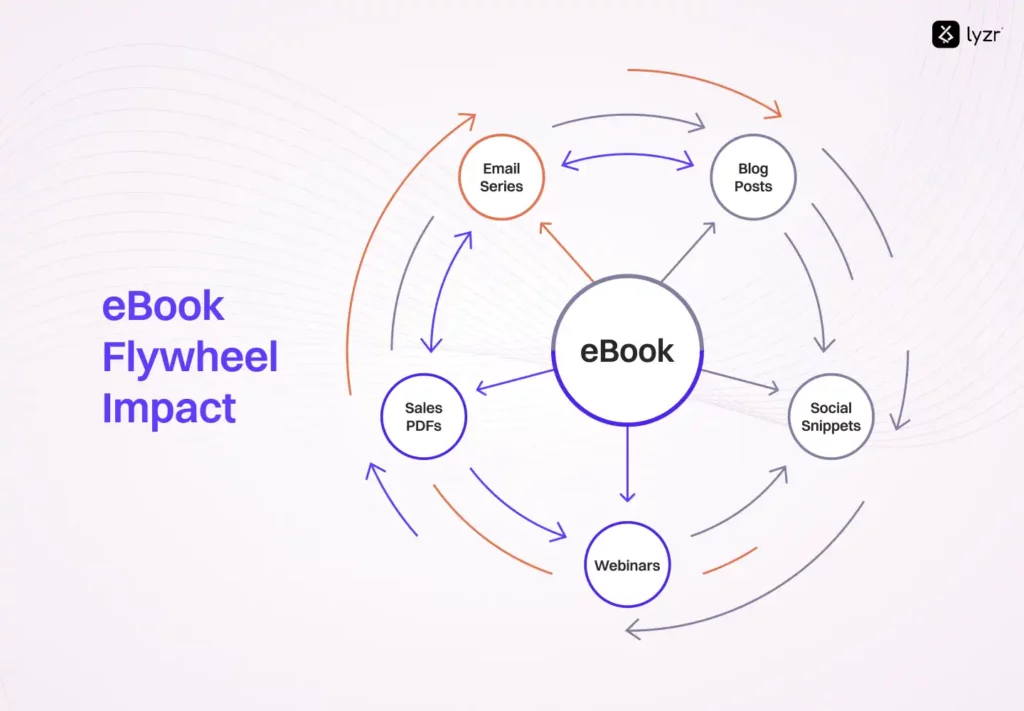
One eBook isn’t one piece of content; it’s the sun around which an entire solar system of content orbits. This “hub-and-spoke” model is the secret to scaling content production efficiently and ensuring a consistent, integrated message across all channels.
The immense, multi-faceted value of eBooks is precisely what makes the broken, inefficient creation process so painful. The most powerful tool in the modern marketer’s arsenal has become the most difficult to build. This glaring disconnect between strategic importance and operational reality is the problem we are engineered to solve.
Why is everyone obsessed with eBooks? Because the data doesn’t lie.
In a world of fleeting social media posts, eBooks are strategic assets that build lasting value. But don’t just take our word for it; look at the numbers:
- The Lead Generation Engine: According to a 2025 Forrester analysis, B2B companies report that gated eBooks generate up to 3x more qualified leads than any other top-of-funnel content format. It’s the ultimate value exchange.
- The Trust Catalyst: A recent study by the Content Marketing Institute revealed that 71% of B2B buyers consumed an eBook during their purchasing journey. Why? Because comprehensive guides build trust and establish your brand as an authority worth listening to.
- The Sales Accelerator: Sales teams equipped with relevant eBooks to share with prospects have been shown to shorten the sales cycle by an average of 15%, as the content does the heavy lifting of education and objection handling upfront.
The conclusion is clear: eBooks aren’t just content. They are a cornerstone of modern marketing strategy, directly impacting lead quality, brand authority, and revenue.
So, if eBooks are a growth cheat code, why is creating them such a nightmare?
Because the traditional process is fundamentally broken. It’s a slow, expensive, and frustrating ordeal that drains your team’s most valuable resources: time and creativity.
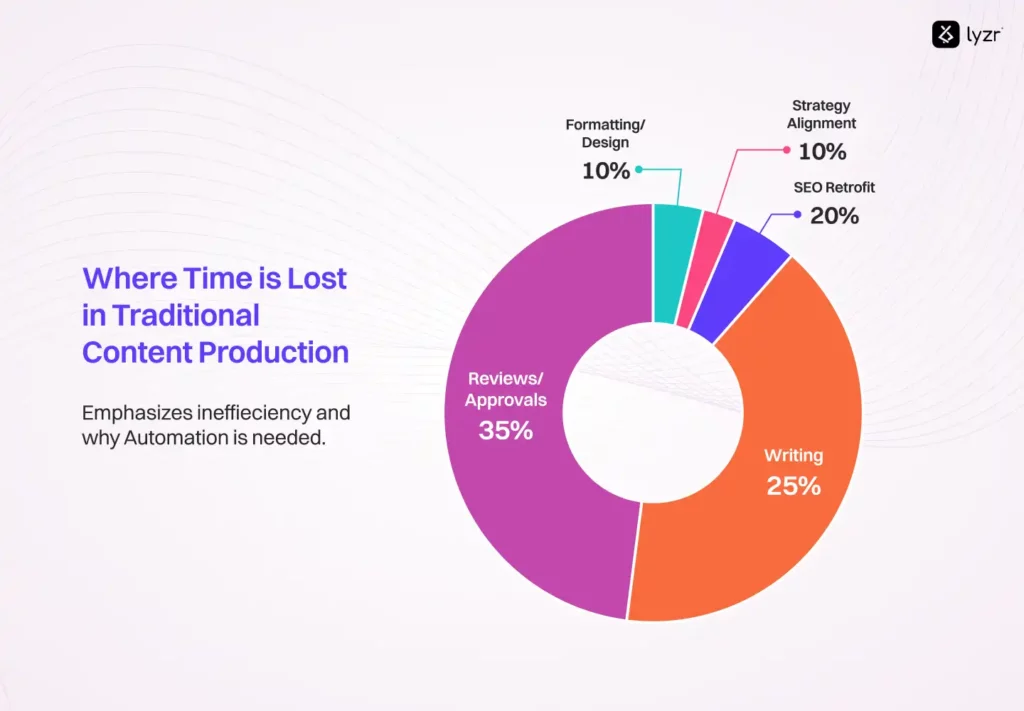
We’ve seen it firsthand. A single eBook takes 50-100+ hours of manual work and can cost anywhere from $5,000 to over $25,000 when you factor in writers, designers, and the endless hours of internal reviews. This is the painful reality marketers face:
- Death by a Thousand Revisions: The endless back-and-forth between the writer, the SEO expert, the product team, and the brand strategist, all working in silos with conflicting feedback.
- The “Generic AI” Trap: You try using a generic AI writer, but it produces soulless, off-brand content that sounds like everyone else and requires a complete rewrite to be usable.
- The SEO Afterthought: The SEO team gets the “final” draft, only to realize it’s not optimized for a single valuable keyword, forcing massive, last-minute changes.
- The Brand Disconnect: The final product lacks your company’s unique voice and proprietary knowledge, failing to differentiate you in a crowded market.
This isn’t a workflow; it’s a bottleneck. It forces your best people to spend their time managing chaos instead of driving strategy.
We built what we wished existed
At Lyzr we saw this broken process and knew there had to be a better way. We asked ourselves: What if you could have an entire, coordinated content team that worked autonomously to create a high-quality, on-brand, SEO-optimized eBook from a single brief?
That’s exactly why we built the AI eBook Generator Agent.
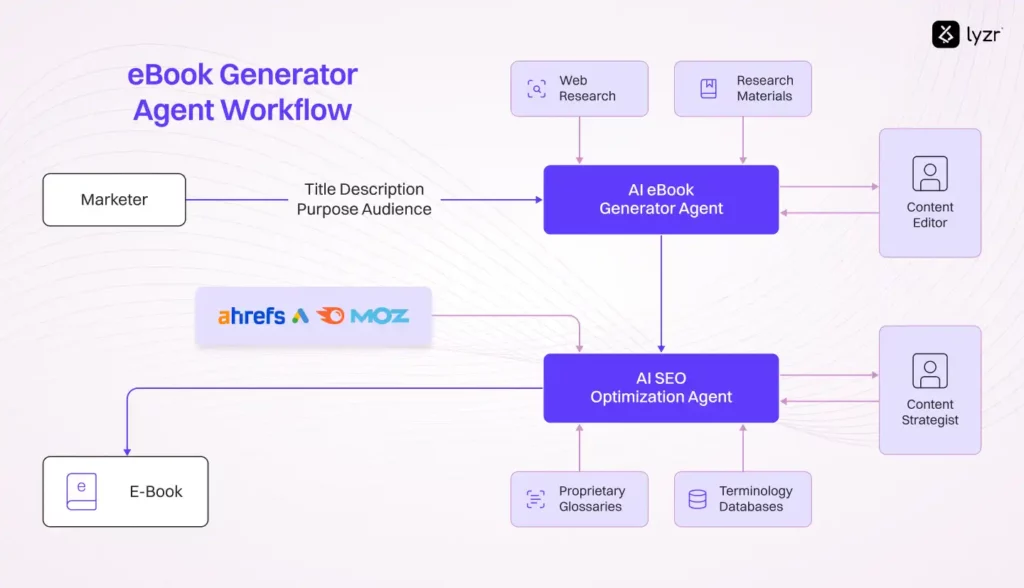
This is not another generic AI writer. It’s a collaborative multi-agent system an autonomous team of specialized AI agents designed to replicate and automate the workflow of a high-performing content team.
- The eBook Generator Agent researches and drafts the content, drawing from live web data and your internal knowledge base.
- The SEO Optimization Agent integrates with tools like Ahrefs and SEMrush to embed a winning SEO strategy from the start.
- The Content Strategist Agent ensures the final piece aligns perfectly with your marketing goals.
We built this because marketers deserve to focus on strategy, not production headaches. We built it to eliminate the bottlenecks, the silos, and the creative drain, so you can finally scale the
From Brief to eBook: Your Autonomous Content Team in Action
We knew fixing the content problem meant redesigning the entire broken workflow. So we built an autonomous team of AI specialists that handles the heavy lifting, turning weeks of manual chaos into a streamlined, predictable process.
It’s a simple, three-step collaboration between you and the system:
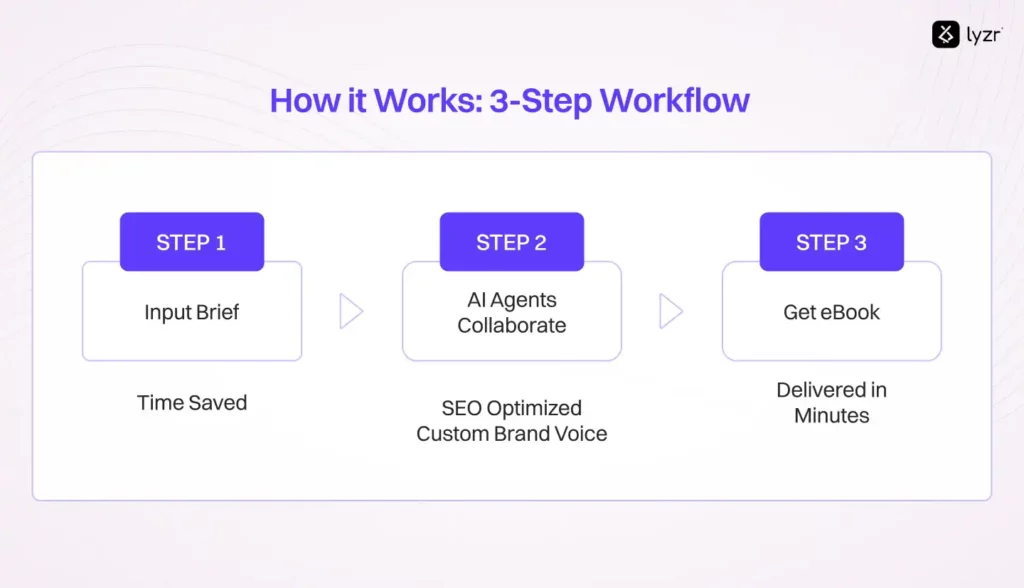
1. You Set the Strategy. It all starts with your vision. You provide a simple brief your topic, your audience, your goal. You are the director; our system is your elite production crew.
2. The System Creates & Refines. Instantly, our agents work in concert. One agent researches live web data and your private knowledge base to write a comprehensive draft. Simultaneously, other specialist agents work to inject your unique brand voice, ensure factual accuracy, and weave in a powerful SEO strategy using real-time data from tools like Ahrefs and SEMrush. The draft is built from the ground up to be on-brand and optimized to rank.
3. You Give the Final Approval. The system delivers a publish-ready eBook directly to you. It’s a workflow designed for human oversight, giving you the final say. This unique partnership combines the incredible speed of AI with your essential strategic control.
And the most powerful part? With every piece of feedback, the entire system gets smarter. It learns your style and preferences, ensuring your next eBook is even better than the last. It’s not just automation; it’s intelligent evolution.
Your Next eBook Doesn’t Need to Be a Bottleneck
The days of choosing between cost, quality, and speed are over. With Lyzr’s AI eBook Generator Agent, you no longer have to compromise. We’ve taken the fractured, slow, and painful process of content creation and replaced it with a coordinated, intelligent, and autonomous content team that delivers results at scale.
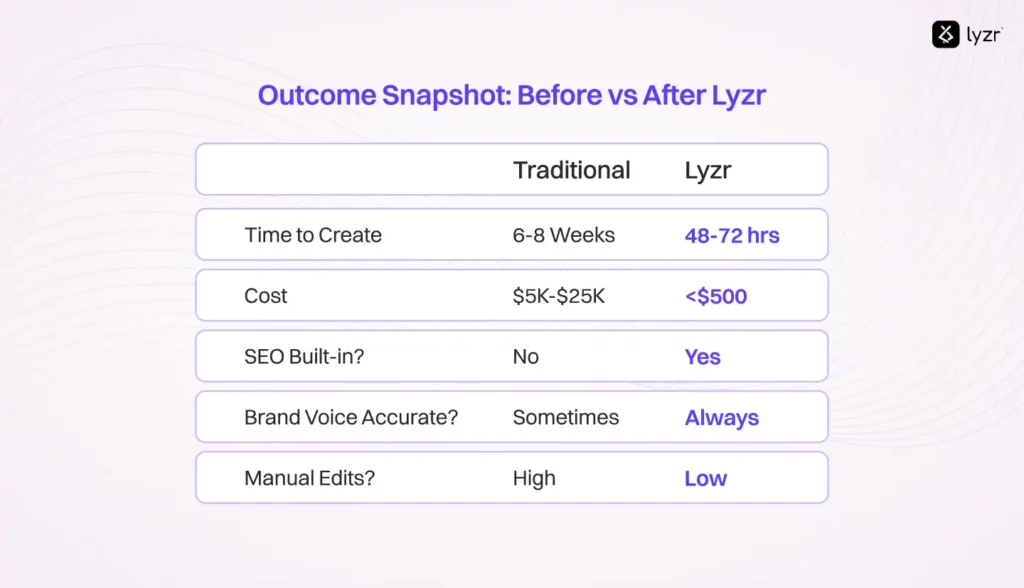
This isn’t a shortcut; it’s a system. One that brings strategy, execution, and optimization into a single, seamless workflow.
One that respects your brand, enhances your voice, and delivers real business value.
Whether you’re a marketing team of two or twenty, this multi-agent system gives you the power to produce high-quality, SEO-optimized, on-brand eBooks at a fraction of the cost and timeagain and again.
This is how modern marketing content should be built: fast, intelligent, and unmistakably yours.
And with Lyzr, it finally is.
Want to see it in action?
Request a demo or get the eBook Generator Agent on Lyzr Studio and turn your next brief into a publish-ready eBook in days, not weeks.
Frequently Asked Questions (FAQs)
1. How is this different from using ChatGPT or other AI writing tools?
Most AI tools generate generic, one-off content. Lyzr’s eBook Generator Agent is a multi-agent system meaning it replicates an entire content team. You don’t just get a writer; you get a strategist, SEO expert, fact-checker, and editor all working in sync to create a complete, on-brand, SEO-optimized eBook from your brief.
2. Will the content match my brand’s voice and tone?
Yes. One of the specialized agents is trained to learn and apply your brand voice consistently across all chapters. The more feedback you give, the better the system becomes at matching your unique style it learns with every iteration.
3. Can it pull from my internal documents or knowledge base?
Absolutely. The system can be securely connected to your internal wikis, Notion pages, PDFs, or knowledge base to create content that reflects your proprietary insights and expertise.
4. How does it handle SEO optimization?
The SEO Optimization Agent integrates with tools like Ahrefs and SEMrush to ensure your eBook is optimized from the ground up — including keyword strategy, structure, and on-page best practices. No more retrofitting SEO after the fact.
Book A Demo: Click Here
Join our Slack: Click Here
Link to our GitHub: Click Here

